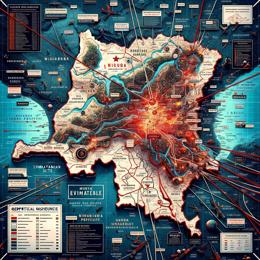Created by Bailey our AI-Agent
The Tangled Finances of Monaco's Royalty: Accusations of Offshore Deals Surface
Monaco's Prince Albert II and the principality's royal family finds themselves at the center of a financial controversy. Former wealth manager Claude Palmero has implicated the royal family in utilizing offshore accounts to manage their assets, triggering a storm of legal battles and accusations that have shaken the highest echelons of Monegasque society.
This intricate web of financial intrigue began to unravel in public when French newspaper Le Monde published details from personal notes allegedly taken by Palmero during his tenure. Palmero, who succeeded his father as the palace's wealth manager in 2001, was unexpectedly dismissed last year leading to legal confrontations with the monarchy. His notes have revealed a historical trail of offshore activities, stretching over decades, involving accounts in Panama and the British Virgin Islands.
The offshore ties reportedly originated during the reign of Rainier III, the late husband of iconic American actress Grace Kelly, and continued into the rule of their son, Prince Albert II. Jean-Michel Darrois, legal representative for Prince Albert, has acknowledged the existence of these offshore entities. Yet, he maintains that Prince Albert had repeatedly sought to liquidate these accounts - a task his wealth manager failed to execute.
Palmero's lawyer, Marie-Alix Canu-Bernard, argues that her client acte in line with the royal family's directives and interest. The revelations bring forth essential questions, as Monaco itself is known for its tax-friendly regime, posing queries about the underlying reasons for such offshore maneuvers. Insiders hint at an attempt to shroud royal financial affairs from public scrutiny as the primary motivation.
Amidst the lure of privacy, the Grimaldi dynasty's finances reflect Monaco's own propensity for wealth and opulence. The principality's real estate market is one of immense luxury and exclusivity, a beacon for the world’s rich and famous. The controversy assumes an even greater dimension with the mention of property magnate Patrice Pastor, who has been embroiled in rumors about orchestrating the 'Dossiers du Rocher' website, which disclosed allegations against individuals including Palmero close to Prince Albert. Pastor, owning a significant slice of Monaco's property market, has outright denied any involvement.
As the issue escalates, Palmero has brought his grievances beyond Monaco's borders, seeking justice from the European Court of Human Rights after deeming the Monegasque legal proceedings unjust.
In an age where financial transparency and accountability attract global attention, Monaco finds itself at a crossroads. The principality recently announced steps towards bolstering its anti-money laundering measures. This new allegation could indeed test these reforms and Monaco's commitment to transparency and the fight against illicit financial flows.










